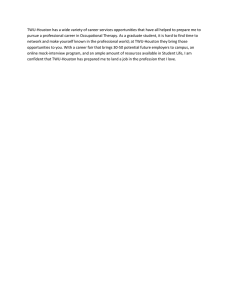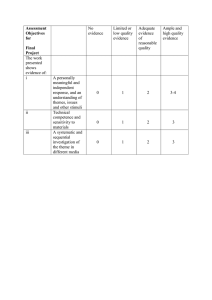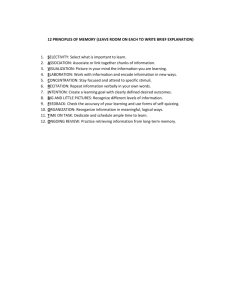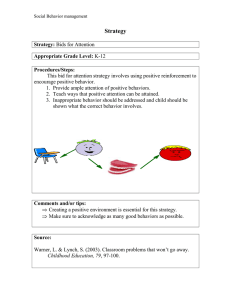Examples of Learning Outcomes Agreement
advertisement
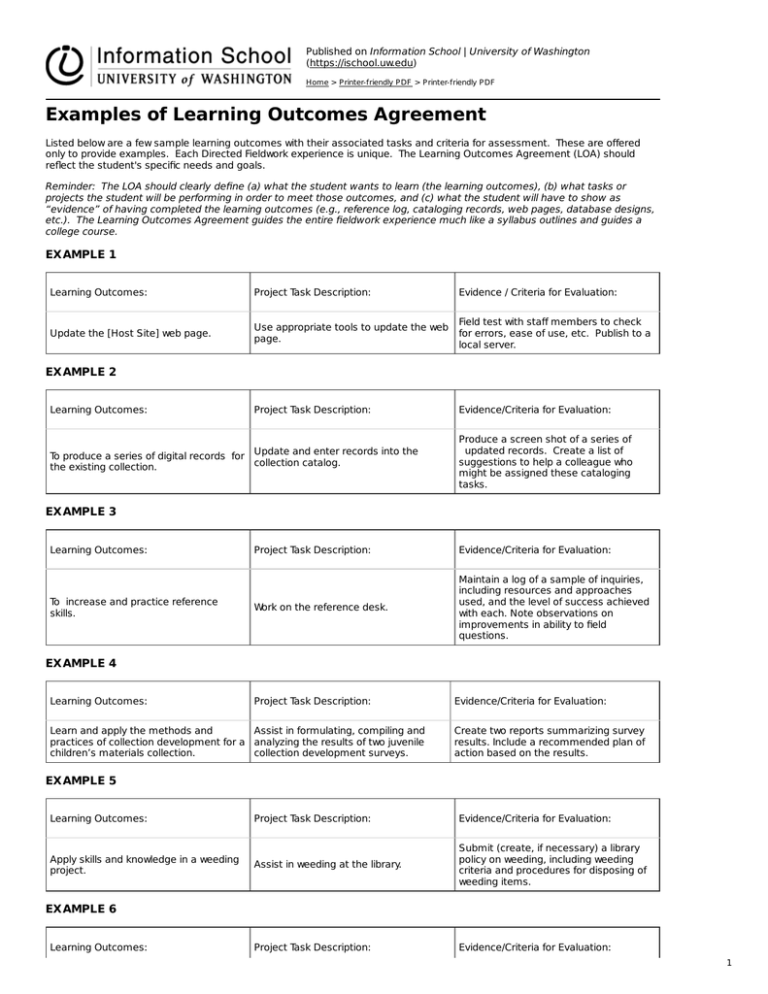
Published on Information School | University of Washington (https://ischool.uw.edu) Home > P rinter-friendly P DF > P rinter-friendly P DF Examples of Learning Outcomes Agreement Listed below are a few sample learning outcomes with their associated tasks and criteria for assessment. These are offered only to provide examples. Each Directed Fieldwork experience is unique. The Learning Outcomes Agreement (LOA) should reflect the student's specific needs and goals. Reminder: The LOA should clearly define (a) what the student wants to learn (the learning outcomes), (b) what tasks or projects the student will be performing in order to meet those outcomes, and (c) what the student will have to show as “evidence” of having completed the learning outcomes (e.g., reference log, cataloging records, web pages, database designs, etc.). The Learning Outcomes Agreement guides the entire fieldwork experience much like a syllabus outlines and guides a college course. EX AMPLE 1 Learning Outcomes: Project Task Description: Evidence / Criteria for Evaluation: Update the [Host Site] web page. Use appropriate tools to update the web page. Field test with staff members to check for errors, ease of use, etc. Publish to a local server. Project Task Description: Evidence/Criteria for Evaluation: EX AMPLE 2 Learning Outcomes: To produce a series of digital records for Update and enter records into the collection catalog. the existing collection. Produce a screen shot of a series of updated records. Create a list of suggestions to help a colleague who might be assigned these cataloging tasks. EX AMPLE 3 Learning Outcomes: To increase and practice reference skills. Project Task Description: Evidence/Criteria for Evaluation: Work on the reference desk. Maintain a log of a sample of inquiries, including resources and approaches used, and the level of success achieved with each. Note observations on improvements in ability to field questions. EX AMPLE 4 Learning Outcomes: Project Task Description: Learn and apply the methods and Assist in formulating, compiling and practices of collection development for a analyzing the results of two juvenile children’s materials collection. collection development surveys. Evidence/Criteria for Evaluation: Create two reports summarizing survey results. Include a recommended plan of action based on the results. EX AMPLE 5 Learning Outcomes: Apply skills and knowledge in a weeding project. Project Task Description: Evidence/Criteria for Evaluation: Assist in weeding at the library. Submit (create, if necessary) a library policy on weeding, including weeding criteria and procedures for disposing of weeding items. Project Task Description: Evidence/Criteria for Evaluation: EX AMPLE 6 Learning Outcomes: 1 Host a successful library program for young adults. Design & implement a young adult program. Create a planning template for a young adult program. Include all considerations to create a successful program, e.g. outcomes, theme, time, place, length of program, preparation resources, implementation materials, tasks and persons responsible for them, evaluation, etc. Summarize the experience with a “tip sheet” for creating successful young adult programs. Project Task Description: Evidence/Criteria for Evaluation: EX AMPLE 7 Learning Outcomes: Update the thesaurus for a special Increase knowledge and skills in creating library. Field test the terms by surveying thesauri. in-house personnel. Add a determined number of thesaurus terms. Report the results of the field test survey. Source URL: https://ischool.uw.edu/mlis/fieldwork/forms/outcomes-agreement University of Washington Information School | ischool.uw.edu 2
